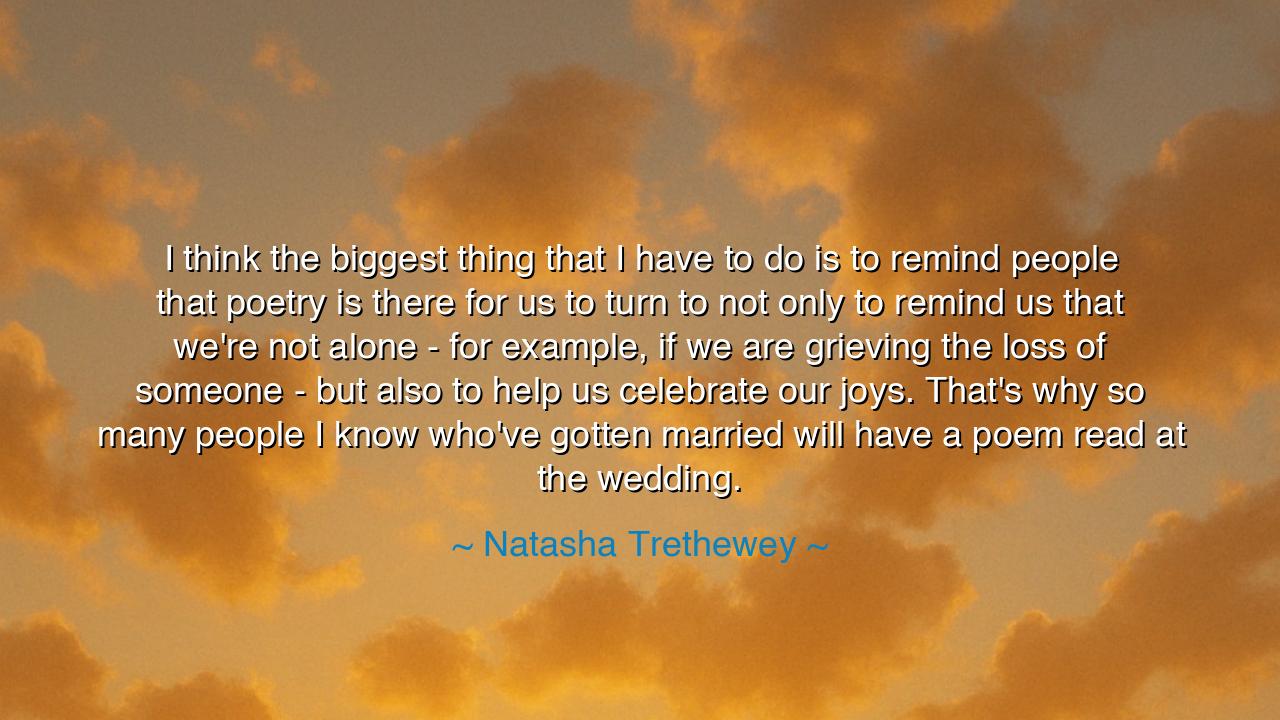
I think the biggest thing that I have to do is to remind people
I think the biggest thing that I have to do is to remind people that poetry is there for us to turn to not only to remind us that we're not alone - for example, if we are grieving the loss of someone - but also to help us celebrate our joys. That's why so many people I know who've gotten married will have a poem read at the wedding.






In the words of Natasha Trethewey, we hear the eternal call of the poet: to remind humanity that poetry is a companion both in sorrow and in joy. She declares that verse is not merely ornament, but refuge—there for us in grief, when we mourn the loss of someone, and in gladness, when we gather to celebrate life’s highest moments. Thus she explains why so many choose a poem read at a wedding: for poetry is the language that gives voice to what hearts cannot say alone.
The ancients understood this truth well. At the union of bride and groom in Greece, hymns of Hymenaios were sung, verses woven with blessing and prophecy. In Rome, odes and epithalamia marked the sacred threshold of new life together. These poems were not trifles; they bound the community to the couple, and lifted the moment into the realm of the eternal. Trethewey’s wisdom is but a modern echo of this ancient practice: that poetry is the proper language for love, for grief, and for the mysteries that lie between.
Her words remind us that in grief, poetry consoles by reminding us that we are not alone. A lament spoken in verse binds the mourner to generations who have wept before. Yet in joy, the same art magnifies delight: for love clothed in metaphor, in rhythm, and in song shines brighter than prose could ever allow. Thus, poetry is not bound to one season of life, but flows through all seasons, a companion both to tears and to laughter.
History gives us reflection in the life of Pablo Neruda, whose verses have been read as often at funerals as at weddings. His odes to love and to loss, whether whispered at gravesides or spoken beneath bridal arches, reveal the same truth Trethewey proclaims: poetry is the bridge between the human heart and the eternal, between sorrow and celebration. It is the voice we borrow when our own falters before the immensity of life.
Therefore, let this wisdom endure: poetry is not luxury, but necessity. In the darkest night, it comforts; in the brightest day, it amplifies joy. That is why the wedding poem endures, why lovers turn to verse to consecrate their vows, and why mourners seek lines to carry their grief. Trethewey’s words remind us that poetry is not distant art but living bread for the soul, sustaining us in both mourning and celebration, ensuring that no heart ever walks alone.






AAdministratorAdministrator
Welcome, honored guests. Please leave a comment, we will respond soon